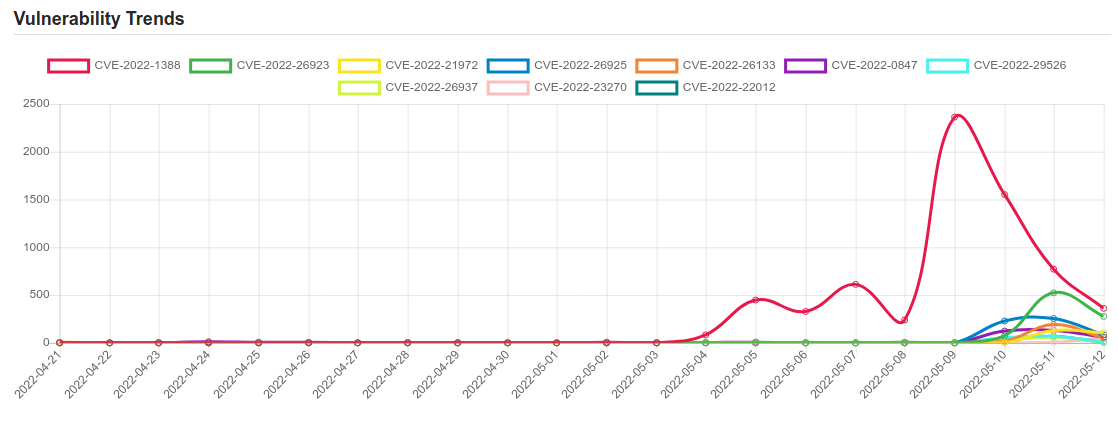Daily Vulnerability Trends: Fri May 13 2022

| CVE NAME | CVE Description |
| CVE-2021-40444 | Microsoft MSHTML Remote Code Execution Vulnerability |
| CVE-2022-30525 | A OS command injection vulnerability in the CGI program of Zyxel USG FLEX 100(W) firmware versions 5.00 through 5.21 Patch 1, USG FLEX 200 firmware versions 5.00 through 5.21 Patch 1, USG FLEX 500 firmware versions 5.00 through 5.21 Patch 1, USG FLEX 700 firmware versions 5.00 through 5.21 Patch 1, USG FLEX 50(W) firmware versions 5.10 through 5.21 Patch 1, USG20(W)-VPN firmware versions 5.10 through 5.21 Patch 1, ATP series firmware versions 5.10 through 5.21 Patch 1, VPN series firmware versions 4.60 through 5.21 Patch 1, which could allow an attacker to modify specific files and then execute some OS commands on a vulnerable device. |
| CVE-2022-29972 | An argument injection vulnerability in the browser-based authentication component of the Magnitude Simba Amazon Redshift ODBC Driver (1.4.14 through 1.4.21.1001 and 1.4.22 through 1.4.x before 1.4.52) may allow a local user to execute arbitrary code. |
| CVE-2022-29109 | Microsoft Excel Remote Code Execution Vulnerability. This CVE ID is unique from CVE-2022-29110. |
| CVE-2022-22965 | A Spring MVC or Spring WebFlux application running on JDK 9+ may be vulnerable to remote code execution (RCE) via data binding. The specific exploit requires the application to run on Tomcat as a WAR deployment. If the application is deployed as a Spring Boot executable jar, i.e. the default, it is not vulnerable to the exploit. However, the nature of the vulnerability is more general, and there may be other ways to exploit it. |
| CVE-2022-0024 | A vulnerability exists in Palo Alto Networks PAN-OS software that enables an authenticated network-based PAN-OS administrator to upload a specifically created configuration that disrupts system processes and potentially execute arbitrary code with root privileges when the configuration is committed on both hardware and virtual firewalls. This issue does not impact Panorama appliances or Prisma Access customers. This issue impacts: PAN-OS 8.1 versions earlier than PAN-OS 8.1.23; PAN-OS 9.0 versions earlier than PAN-OS 9.0.16; PAN-OS 9.1 versions earlier than PAN-OS 9.1.13; PAN-OS 10.0 versions earlier than PAN-OS 10.0.10; PAN-OS 10.1 versions earlier than PAN-OS 10.1.5. |
| CVE-2022-1388 | On F5 BIG-IP 16.1.x versions prior to 16.1.2.2, 15.1.x versions prior to 15.1.5.1, 14.1.x versions prior to 14.1.4.6, 13.1.x versions prior to 13.1.5, and all 12.1.x and 11.6.x versions, undisclosed requests may bypass iControl REST authentication. Note: Software versions which have reached End of Technical Support (EoTS) are not evaluated |
| CVE-2022-26133 | SharedSecretClusterAuthenticator in Atlassian Bitbucket Data Center versions 5.14.0 and later before 7.6.14, 7.7.0 and later prior to 7.17.6, 7.18.0 and later prior to 7.18.4, 7.19.0 and later prior to 7.19.4, and 7.20.0 allow a remote, unauthenticated attacker to execute arbitrary code via Java deserialization. |
| CVE-2022-0847 | A flaw was found in the way the “flags” member of the new pipe buffer structure was lacking proper initialization in copy_page_to_iter_pipe and push_pipe functions in the Linux kernel and could thus contain stale values. An unprivileged local user could use this flaw to write to pages in the page cache backed by read only files and as such escalate their privileges on the system. |
| CVE-2022-29526 | No description provided |
| CVE-2022-26937 | Windows Network File System Remote Code Execution Vulnerability. |
| CVE-2022-23270 | Point-to-Point Tunneling Protocol Remote Code Execution Vulnerability. This CVE ID is unique from CVE-2022-21972. |
| CVE-2022-22012 | Windows LDAP Remote Code Execution Vulnerability. This CVE ID is unique from CVE-2022-22013, CVE-2022-22014, CVE-2022-29128, CVE-2022-29129, CVE-2022-29130, CVE-2022-29131, CVE-2022-29137, CVE-2022-29139, CVE-2022-29141. |
| CVE-2022-1040 | An authentication bypass vulnerability in the User Portal and Webadmin allows a remote attacker to execute code in Sophos Firewall version v18.5 MR3 and older. |
| CVE-2021-26339 | A bug in AMD CPU’s core logic may allow for an attacker, using specific code from an unprivileged VM, to trigger a CPU core hang resulting in a potential denial of service. AMD believes the specific code includes a specific x86 instruction sequence that would not be generated by compilers. |
| CVE-2022-29130 | Windows LDAP Remote Code Execution Vulnerability. This CVE ID is unique from CVE-2022-22012, CVE-2022-22013, CVE-2022-22014, CVE-2022-29128, CVE-2022-29129, CVE-2022-29131, CVE-2022-29137, CVE-2022-29139, CVE-2022-29141. |
| CVE-2022-29108 | Microsoft SharePoint Server Remote Code Execution Vulnerability. |
| CVE-2022-26923 | Microsoft Windows Active Directory Domain Services privilege escalation | CVE-2022-26923 |
| CVE-2022-21972 | Microsoft Windows Point-to-Point Tunneling Protocol code execution | CVE-2022-21972 |
| CVE-2022-26925 | Microsoft Windows spoofing | CVE-2022-26925 |
If you like the site, please consider joining the telegram channel and supporting us on Patreon using the button below.


![[QILIN] - Ransomware Victim: www[.]nuphoton[.]com 3 image](https://www.redpacketsecurity.com/wp-content/uploads/2024/09/image-300x300.png)